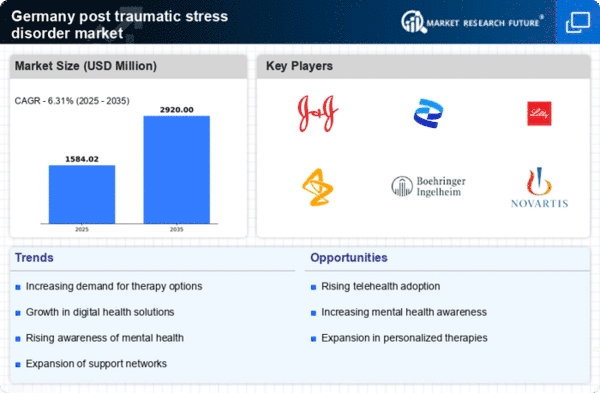Rising Incidence of PTSD Cases
The post traumatic-stress-disorder market is experiencing growth due to the rising incidence of PTSD cases in Germany. Recent studies indicate that approximately 3.6% of the German population may experience PTSD at some point in their lives. This prevalence is particularly notable among veterans and individuals exposed to traumatic events, such as accidents or violent crimes. The increasing recognition of PTSD as a serious mental health issue has led to greater demand for effective treatment options. Consequently, healthcare providers are focusing on developing innovative therapies and interventions tailored to the needs of affected individuals. This trend is likely to drive investment in the post traumatic-stress-disorder market, as stakeholders seek to address the growing mental health crisis in the country.
Government Initiatives and Funding
Government initiatives aimed at improving mental health services are significantly impacting the post traumatic-stress-disorder market. In Germany, the government has allocated substantial funding to enhance mental health care, with a focus on PTSD treatment. For instance, the Federal Ministry of Health has introduced programs to increase access to psychological support for trauma survivors. These initiatives not only aim to reduce the stigma associated with mental health issues but also encourage research and development in the field. As a result, the post traumatic-stress-disorder market is likely to benefit from increased resources and support, fostering innovation and improving treatment outcomes for patients.
Advancements in Therapeutic Techniques
Advancements in therapeutic techniques are playing a pivotal role in shaping the post traumatic-stress-disorder market. Innovative approaches, such as Eye Movement Desensitization and Reprocessing (EMDR) and cognitive-behavioral therapy (CBT), have shown promising results in treating PTSD. Research indicates that these methods can significantly reduce symptoms in affected individuals, leading to improved quality of life. As more practitioners adopt these evidence-based techniques, the demand for specialized training and resources in the post traumatic-stress-disorder market is expected to rise. This trend may also encourage collaboration between mental health professionals and researchers to further refine and develop effective treatment modalities.
Increased Focus on Holistic Approaches
The post traumatic-stress-disorder market is witnessing an increased focus on holistic approaches to treatment. Many practitioners are recognizing the importance of addressing not only the psychological aspects of PTSD but also the physical and emotional well-being of patients. Integrative therapies, such as mindfulness, yoga, and art therapy, are gaining traction as complementary options to traditional treatments. This shift towards a more comprehensive understanding of mental health may lead to a broader range of services offered within the post traumatic-stress-disorder market. As patients seek more personalized and holistic care, providers are likely to adapt their offerings to meet these evolving preferences.
Growing Acceptance of Mental Health Treatment
The growing acceptance of mental health treatment in Germany is a crucial driver for the post traumatic-stress-disorder market. As societal attitudes shift, more individuals are seeking help for mental health issues, including PTSD. Surveys indicate that around 60% of Germans now view mental health treatment as essential, compared to previous years when stigma was prevalent. This cultural change encourages individuals to pursue therapy and counseling, leading to a higher demand for PTSD-specific treatments. Consequently, the post traumatic-stress-disorder market is likely to expand as healthcare providers adapt to meet the needs of a more open and accepting population.
















